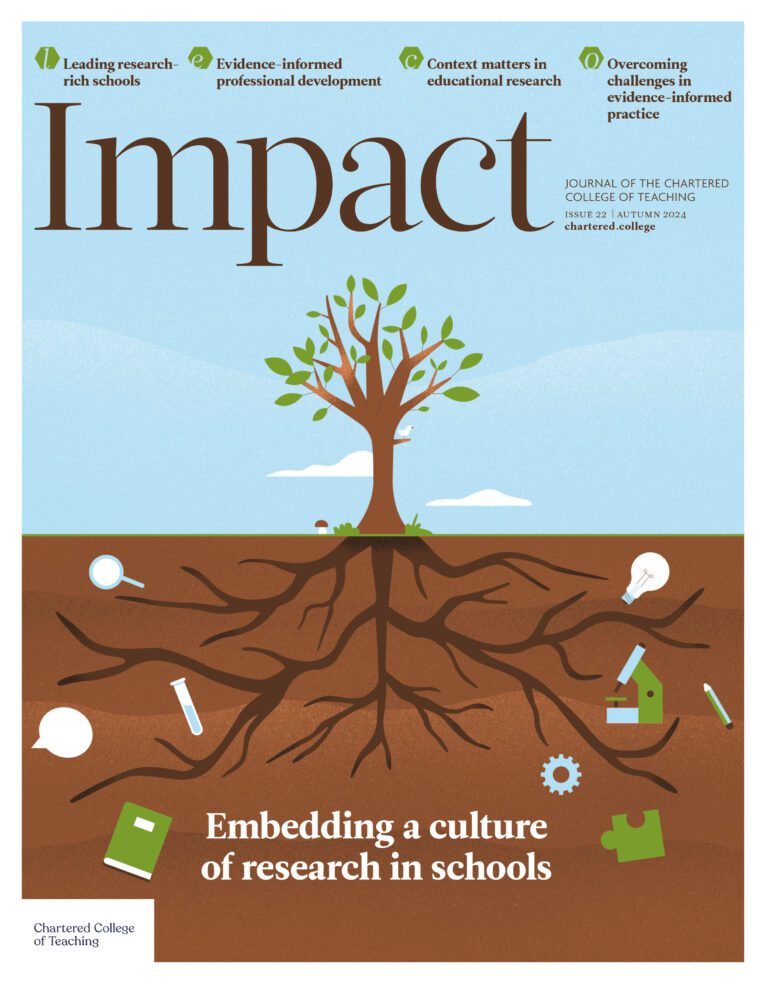FROM THE EDITOR
PROFESSOR TANYA OVENDEN-HOPE, PROFESSOR OF EDUCATION AND DEAN OF PLACE AND SOCIAL PURPOSE, PLYMOUTH MARJON UNIVERSITY; BERA COUNCIL MEMBER AND BERA SPECIAL INTEREST GROUP CONVENOR, UK
Evidence-based and evidence-informed teaching have become increasingly important aspects of educational practice and policy in the UK, with a growing emphasis on teachers as researchers and schools as research collaborators. Evidence-based teaching is the ‘seeking out and using: quantitative and qualitative research findings’ (Coldwell et al., 2017, p. 4) to develop pedagogy and practice. Research-informed and evidence-informed teaching are terms used interchangeably and emphasise that ‘teaching, as a complex, situated professional practice, draws on a range of evidence and professional judgment, rather than being based on a particular form of evidence’ (Coldwell et al., 2017, p. 5). Evidence-informed teaching therefore positions educators not only as consumers of research or evidence, but also as professionals who engage critically with it and apply it thoughtfully to their specific contexts. Evidence-informed teaching also includes evidence generated by teacher researchers or in partnership with other educational researchers, to be used to improve pedagogy and practice.
This shift towards a more research-rich culture in schools and colleges has been driven by a recognition of the potential benefits for students and teachers (EEF, 2024), as well as by policy reforms advocating for greater use of research in educational settings (DfE, 2016). In 2011, the Department for Education (DfE) invested £125 million in a founding grant for the Education Endowment Foundation (EEF), an independent charity that supports schools ‘to improve teaching and learning through better use of evidence’ (EEF, 2024). The commitment of the government to a research-literate teaching profession was presented in 2016 in the ‘Educational excellence everywhere’ white paper, which called for teaching to be ‘evidence-informed’ in England. Research Schools were developed in 2016, enabling schools that had research-rich cultures to have government funding for supporting other schools to become evidence-informed to improve practice:
Research Schools provide support to schools, colleges, and early years settings to access, understand, and apply evidence, to improve quality of teaching and learning, especially for children from socio-economically disadvantaged backgrounds.
Research Schools Network, 2024
Subsequent policy from the DfE has embedded evidence-informed and/or evidence-based practice into education reform for the schools workforce, notably in initial teacher training, e.g. through the Core Content Framework (DfE, 2019a), and teacher professional development, e.g. within the Early Career Framework (DfE, 2019b) (and soon to be ITTECF (DfE, 2024)) and National Professional Qualifications (DfE, 2020). In further education in England, the professional standards from the Society for Education and Training state the importance of research to the profession:
9. Critically review and apply your knowledge of educational research, pedagogy, and assessment to develop evidence-informed practice.
Society for Education and Training, 2024
In Wales in 2021, the Welsh Government began work with universities, local authorities, regional consortia and hub schools to ‘develop a model for an evidence-informed profession’ (Welsh Government, 2021) as part of their national strategy for education. Education Scotland has a national model of professional learning that embeds ‘learning by enquiring’ and funds teachers in attaining master’s-level qualifications, which are underpinned by research evidence to inform practice (Education Scotland, 2024). The strategy for teacher professional learning in Northern Ireland (Department of Education for Northern Ireland, 2016) identifies ‘researcher’ in the characteristics of a teacher and expects ‘learning drawn down from research’ to be at the core of best practice.
The British Educational Research Association (BERA), which represents the four nations of the UK, has a charitable objective to:
encourage the pursuit of educational research and its application for both the improvement of practice and the public benefit
BERA, 2024a
BERA, celebrating its 50th anniversary this year, has throughout this time championed the importance of school and college engagement with educational research, as producers, users and collaborators. Ten years ago, BERA commissioned, with the Royal Society of Arts (RSA), an inquiry into Research and the Teaching Profession to understand the relationship between research and schools and colleges. The inquiry found, based on substantial evidence, that engaging with research is beneficial for schools and colleges and those that teach and learn in them:
Internationally, enquiry-based (or ‘research-rich’) school and college environments are the hallmark of high performing education systems. To be at their most effective, teachers and teacher educators need to engage with research and enquiry.
BERA and RSA, 2014, p. 6
BERA and the RSA made the case for a new relationship for educational research and teaching across educational sectors:
The development, across the UK, of self-improving education systems in which all teachers become research literate and many have frequent opportunities for engagement in research and enquiry. This requires that schools and colleges become research-rich environments in which to work. It also requires that teacher researchers and the wider research community work in partnership, rather than in separate and sometimes competing universes.
BERA and RSA, 2014, p. 1
This seminal report on research in schools and colleges (BERA and RSA, 2014) laid the foundation for the systems change outlined previously in government reforms, and supported the UK teaching profession moving towards a ‘research-rich’ culture. This autumn’s issue of Impact demonstrates the deliberate engagement of teachers with research through a robust collection of papers reflecting evidence-informed practice and sharing research findings. It also showcases how the educational research community, in all its forms, is working together to provide evidence that supports best practice and outcomes in a range of education settings and contexts. As a BERA Council Member, Fellow of the Chartered College of Teaching and educational researcher with roots firmly laid as a teacher researcher, it has been a privilege to edit this issue of Impact. We received the greatest number of abstracts in Impact’s history for this issue, a reflection of research literacy and critical engagement with evidence-based practice in the teaching profession.
We begin our exploration of the relationship between educational research, evidence-informed practice and cross-sector collaboration for a self-improving education system by focusing on the importance of leading research-rich schools and colleges. Education leaders are presented with structures, processes and approaches that have been examined and found to support a culture of research engagement. The schools as learning organisations concept, which has continuous learning, collaboration and innovations at its core, is recommended by Mark Leswell to create a culture that values and promotes research engagement. Jo Gleeson, Mark Rickinson, Lucas Walsh and Blake Cutler remind us of how important it is to ensure that research is used well in schools (and, I would argue, colleges), and offer ways for leaders and all educators to embed this into practice through a new model for quality use of research. Emily Giubertoni presents a case study of a distributed leadership model that created a professional learning community of research-engaged teachers and which sustained changes in practice that benefit students. The last two articles in this section both consider performance and appraisal processes as the staff development structure for embedding a school culture of research- and evidence-informed practice. It is interesting to consider how teachers who develop a research question (Lisa Edmenson and Emma Aubrey) or mandatory inquiry question (Jo Stawman and Gemma Parker) or focused on their own teaching, have enhanced practice to benefit students.
Evidence-informed professional development (EIPD) is fundamental to the development of research-rich schools and colleges, and our second section develops this theme. The significance of learning networks for effective evidence-informed practice and engagement is evidenced throughout this issue, and the BERA Teacher Network offers an additional opportunity for teachers to collaborate and share inquiry questions across sectors (Luke Donnelly). Other considerations for effective EIPD include: enquiry as a way of being for considerations of whole-school culture (Alex Morgan, Emmajane Milton, Lisa Mullan, Mark Walker and Wil Howlett); professional formation through Qualified Teacher Learning and Skills accreditation in further education (Stephanie Marshall-Whitley); the need for critical engagement with evidence, e.g. Rosenshine, using an expansive learning cycle (Christian Bokhove and Rosalyn Hyde); journal clubs for the full teaching workforce (Steve Murray); and context awareness in formulating questions about pedagogy and practice (Richard Harvey-Swanston, Kerri Burns and Tiff Cole).
Understanding of the context of education settings is paramount in developing appropriate and effective pedagogy and practice. Context matters in educational research, and in the third section context is considered through the lenses of school phase, diversity, pedagogical theory and technology. These research findings and reflections demonstrate a range of educational research collaborations, different types of educational researchers – including doctoral students and teacher researchers – and different research and inquiry methods. Muhammad Naeem (my successful PhD student) and I consider culturally sensitive schooling and parental school choice among the Pakistani Muslim community in Blackburn, using a qualitative research methodology. The development of creative practice through action research is explored in a primary school setting (as part of a large national project) by Ursula Crickmay, Sarah Childs and Kerry Chappell, a school and university collaborative project. Tara Kiran Kurre explores the literature to argue for neuroscience in the form of biomarkers offering the possibility to improve pedagogical interventions, as long as neuromyths common in teaching practice are dispelled. The introduction of an evidence-informed self-regulated learning model at Key Stage 3 is evaluated by Sophie Appelqvist, who found increases in confidence and independence among the pupils who experienced it.
The final section of Impact 22 deliberates the ethical considerations for and how to overcome the challenges of establishing a research-rich educational environment. BERA established the first ethical guidelines for educational researchers in 1992, and has since reviewed and updated them regularly to ensure that they are representative of the complex and rapidly changing educational research landscape in the UK and globally. The fifth iteration of the BERA Ethical Guidelines was launched in April 2024 (BERA, 2024b), and they make essential reading for any educational researcher. The BERA Ethical Guidelines advocate that all research should be conducted with an ‘ethic of respect’ for:
people; knowledge; the quality of educational research; the environment; and academic freedom
BERA, 2024b, p. 9
BERA (2024b, p. 9) recognises that ‘applying an ethic of respect may reveal tensions or challenges’, and some of these are explored in this section. Robert Caudwell identifies the tensions that exist between the users of research findings and the producers, highlighting the conceptions of ‘truth’ and ‘usefulness’ as ways of navigating and embracing the complexity of translating research findings into practice. Karen Boardman, Silvia Cont and Chris Davey, proposes ‘research circles’ as an ethical approach for research with education settings (and families and communities). They argue that the collective process of research circles establishes principles of integrity that prevent typical ethical dilemmas of power dynamics and boundaries, ownership of data and social action. The challenge for connecting theory, research and professional practice is explored by Julia Flutter, who argues that the Chartered College of Teaching and professional networks are the vehicles for driving forward an evidence-informed teaching profession. The mutual benefits for schools and research institutions are presented by Michael Taylor. We end, however, with Therese Andrews’ cautionary warning on the ethical implications of teachers and leaders researching their own practice. The BERA Ethical Guidelines (BERA, 2024b) state that participants should give ‘voluntary informed consent’, which should be given by all involved in educational research, regardless of who is undertaking it.
This issue has taken an open look at research and the teaching profession, with a focus on the robustness, reliability and relevance of research findings for education settings. The range of voices from across the educational research community have strengthened the relationship between theory and practice. It is clear that a culture of research- and evidence-informed practice is continuing to develop and enhance the ‘self-improvement’ journey of schools and colleges. What is also clear is that how this culture is developed and how teachers engage with research are ‘as important as that it actually occurs in the first place’ (Groß Ophoff et al., 2023).















































